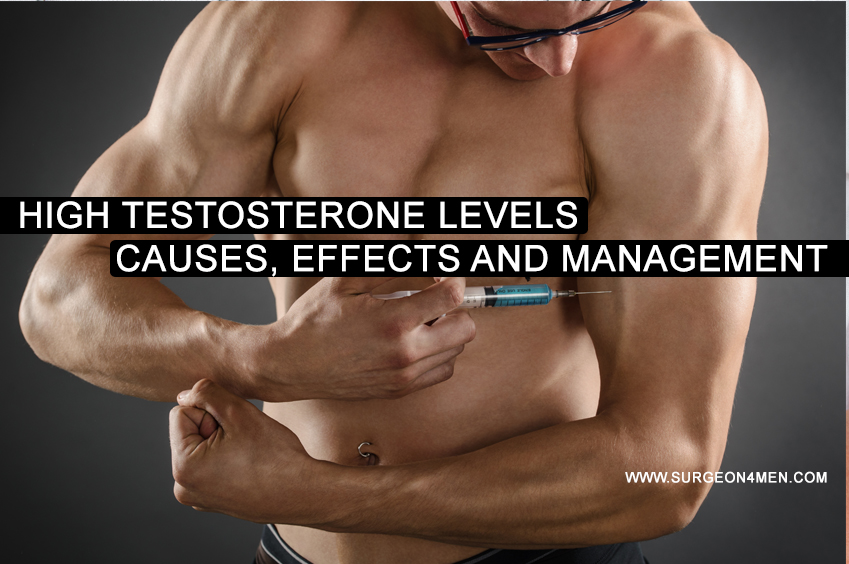High Testosterone Levels: Causes, Effects And Management
Testosterone is a naturally occurring steroid hormone that is produced mainly by the key male reproductive gland – testes. Small quantities of this hormone is also produced by the adrenal glands and ovaries in females. It is imperative to mention that testosterone is responsible for the development of male reproductive organs as well as secondary sexual characteristics such as change of voice, growth in muscle mass and hair growth on face and other parts of the body.
The bodily production and serum levels of testosterone increases significantly at the time of adolescence and then begins to decline gradually with physiological aging process. A significant reduction in the serum testosterone levels can lead to negative symptoms such as mood swings, decreased libido and erectile dysfunction.
High Testosterone And Its Medical Causes
In medical practice, most men report to their healthcare provider with complaints of low testosterone levels. In other words, high testosterone is a rare condition and always has some underlying cause. The various pathological causes of high testosterone levels include:
- Hyperthyroidism
It has been observed that testosterone levels increases when thyroid hormones are abnormally high. The pathophysiology mainly revolves around the increased synthesis of hormone transporting proteins in the serum.
- Tumors Of Testis/Adrenal Glands
As discussed previously, adrenal gland secretes small quantities of testosterone under normal circumstances. However, if there is a tumor or growth, the secretary potential of the gland increases. Likewise, there will be excessive production of testosterone with the malignancy of testicles.
It has been seen that the testosterone levels are higher in males who go through puberty at an early age.
- Testosterone Replacement Therapy
This is the commonest cause of excessive testosterone in the body. This usually occurs when patients are being over-treated for low testosterone symptoms in the maturing years.
Use Of Anabolic Steroids And Its Effects
Anabolic steroids are synthetic form of testosterone. These are commonly abused by the athletes and body builders. The adverse effects are commonly misunderstood as symptoms of high testosterone, like rage, aggressive behavior, irritability and poor mental judgment. Overuse of these anabolic steroids can lower the production of natural testosterone in the body causing reduction in the testicular size.
Side Effects Of High Testosterone
Persistently high testosterone levels can present with a variety of adverse symptoms; such as:
- Prostate enlargement
- Breast enlargement (Gynaecomastia)
- Acne
- Fluid retention
- Decreased size of testis
- Decreased sperm count in semen
- Frequent mood swings – mainly with injectable testosterone
- Sleep apnea
- Increased hematocrit (red blood cells mass) causing increased blood viscosity
Breast enlargement and shrunken testis are due to the conversion of excess testosterone into female hormone estrogen.
Management Of High Testosterone
1) Avoid Testosterone Replacement Therapy as much as possible. This should be started on the advice of a qualified physician only when one needs it. It shouldn’t be taken just to boost the libido or to enhance muscle mass.
2) Lifestyle changes can help with the patients with low testosterone problems. These should be tried instead of the replacement therapy:
- Consumption of a balanced diet, low in sugars is ideal at improving testosterone levels. You should also increase your intake of healthy fats and fructose. Foods rich in zinc such as oysters and pomegranate can also help boost the hormone levels in a natural way
- High intensity exercises
- Strength training
- Managing stress
- Optimizing Vitamin D levels
- Losing weight
References
- Romero‐Martínez, Á., Lila, M., Sariñana‐González, P., González‐Bono, E., & Moya‐Albiol, L. (2013). High testosterone levels and sensitivity to acute stress in perpetrators of domestic violence with low cognitive flexibility and impairments in their emotional decoding process: A preliminary study. Aggressive behavior, 39(5), 355-369.
- Shores, M. M., Smith, N. L., Forsberg, C. W., Anawalt, B. D., & Matsumoto, A. M. (2012). Testosterone treatment and mortality in men with low testosterone levels. The Journal of Clinical Endocrinology & Metabolism, 97(6), 2050-2058.
- Léon, P., Seisen, T., Cussenot, O., Drouin, S. J., Cattarino, S., Compérat, E., … & Rouprêt, M. (2015, September). Low circulating free and bioavailable testosterone levels as predictors of high-grade tumors in patients undergoing radical prostatectomy for localized prostate cancer. In Urologic Oncology: Seminars and Original Investigations (Vol. 33, No. 9, pp. 384-e21). Elsevier.
